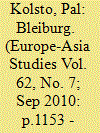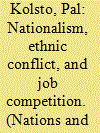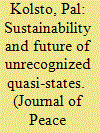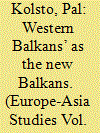| Srl | Item |
| 1 |
ID:
098357


|
|
|
|
|
| Publication |
2010.
|
| Summary/Abstract |
In a study of historical myths in South Eastern Europe in 2005 I identified four different types of mythologies, one of which was the myth of martyrdom (Kolsto 2005). I pointed out that while nations most of the time celebrate their victories and moments of glory, occasionally their great tragedies and defeats are also embellished into mythical stories and made into objects of collective commemoration. As a prime example of mythologised defeats in the history of the Balkan peoples I-like many other authors-singled out the battle of Kosovo in 1389, an event which in contemporary Serbian consciousness has come to be regarded as the moment when the Serb nation chose righteousness and truth over earthly power (Vuchinich & Emmert 1991; Anzulovic 1999, pp. 11-22; Judah 2000).
|
|
|
|
|
|
|
|
|
|
|
|
|
|
|
|
| 2 |
ID:
080806


|
|
|
|
|
| Publication |
2008.
|
| Summary/Abstract |
The article examines the effects of job competition on ethnic relations within a multinational state. It argues that demographic increase leads to competition for blue-collar jobs while an increase in the number of graduates from higher education leads to competition over elite jobs. In the first case, people risk unemployment, in the second, blocked career opportunities. Mass-level unemployment may lead to anger-driven mass riots, while an intelligentsia will formulate more rational strategies to eliminate threatening competitors from the labour market. One such strategy is to insist that the state ought to be a national state, in which the national elites will be in control. While questions of identity no doubt also may have an enormously mobilising power in times of national resurgence, identity issues are normally intimately intertwined with interest politics. These mechanisms are traced in the history of ethnic mobilisation in the Soviet Union and the post-Soviet states during and after perestroika
|
|
|
|
|
|
|
|
|
|
|
|
|
|
|
|
| 3 |
ID:
179204


|
|
|
|
|
| Summary/Abstract |
Do authoritarian regimes engage in active export of their political systems? Or are they primarily concerned about their geopolitical interests? This article explores these questions by examining Russia’s policy towards Abkhazia, South Ossetia, and Transnistria. In all three de facto states, Moscow is fully able to dictate election outcomes should it desire to, but, we argue, has increasingly refrained from doing so. These client states are unlikely to attempt to escape from Russia’s tutelage; and with its geopolitical interests fully ensured, Russia appears willing to grant them latitude. We then ask whether these findings can be extrapolated to serve as a template for understanding Russia’s policy towards its client states more generally, discussing Moscow’s reactions to attempted regime change in Armenia and Belarus.
|
|
|
|
|
|
|
|
|
|
|
|
|
|
|
|
| 4 |
ID:
076109


|
|
|
| 5 |
ID:
147954


|
|
|
|
|
| Summary/Abstract |
The word ‘Balkans’ often functions as a stigma. Several authors have discussed the bloodbath during the wars in the former Yugoslavia with references to an alleged Balkan culture. Towards the end of the 1990s the term ‘Balkans’ entered the official vocabulary of the European Union, now with the prefix ‘Western’. ‘The Western Balkans’ became a common denominator for non-member states in south eastern Europe. A survey in 2011 in the ‘Western Balkans’ showed that those who live there to a large extent share this view: membership in Western organisations like the EU determines whether a country is ‘European’ or ‘Balkan’.
|
|
|
|
|
|
|
|
|
|
|
|
|
|
|
|